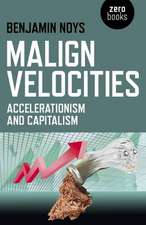The Persistence of the Negative
Autor Benjamin Noysen Limba Engleză Paperback – 12 mar 2012 – vârsta de la 22 ani
In this bold and highly original book, Benjamin Noys rethinks the role of the negative in both ontology and political practice. His critical revaluations of familiar figures in recent European thought move in surprising new directions; they have forced me to reconsider much that I thought I knew.
Steven Shaviro, DeRoy Professor of English, Wayne State University.
Benjamin Noys' brilliant and wide-ranging new book is a timely reminder that no revolutionary and egalitarian approach to politics and philosophy can afford to overlook the disruptive "labour of the negative", or to neglect the active contribution that contradiction and antagonism make to a critique of actually-existing forms of domination on the one hand and a renewal of emancipatory agency on the other.
Peter Hallward, Professor of Modern European Philosophy, Middlesex University
The Persistence of the Negative is a compelling critique of contemporary continental theory. It contests the tendency of recent theory to rely on affirmation, and especially an affirmative thinking of resistance. Through a series of incisive readings of leading theoretical figures of this affirmationism - Jacques Derrida, Gilles Deleuze, Bruno Latour, Antonio Negri, and Alain Badiou - this book reveals a profound current of negativity that allows theory to return to its political calling. It is essential reading for anyone concerned with continental theory and its relation to left politics.
Benjamin Noys is Reader in English at the University of Chichester. He is the author of Georges Bataille: A Critical Introduction (2000) and The Culture of Death (2005).
| Toate formatele și edițiile | Preț | Express |
|---|---|---|
| Paperback (1) | 191.38 lei 3-5 săpt. | +37.54 lei 7-11 zile |
| EDINBURGH UNIVERSITY PRESS – 12 mar 2012 | 191.38 lei 3-5 săpt. | +37.54 lei 7-11 zile |
| Hardback (1) | 558.51 lei 6-8 săpt. | |
| EDINBURGH UNIVERSITY PRESS – 12 sep 2010 | 558.51 lei 6-8 săpt. |
Preț: 191.38 lei
Preț vechi: 213.98 lei
-11% Nou
36.62€ • 38.24$ • 30.24£
Carte disponibilă
Livrare economică 25 martie-08 aprilie
Livrare express 11-15 martie pentru 47.53 lei
Specificații
ISBN-10: 0748649042
Pagini: 196
Dimensiuni: 152 x 231 x 15 mm
Greutate: 0.34 kg
Editura: EDINBURGH UNIVERSITY PRESS












